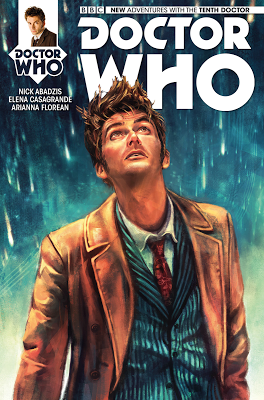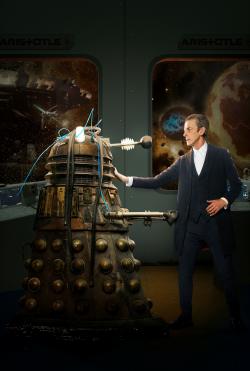New Adventures with The Eleventh Doctor - Issue 2 - The Friendly Place
Friday, 19 September 2014 - Reviewed by
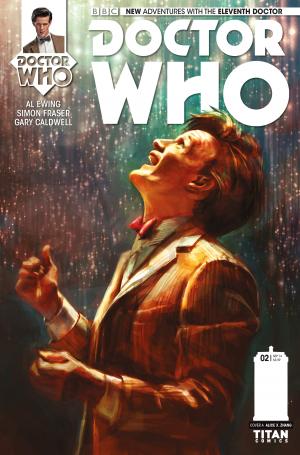 "And I'm not sulking. It just looks like I'm sulking. It's special Time Lord Meditational .. thinky stuff" - The Doctor to Alice.
"And I'm not sulking. It just looks like I'm sulking. It's special Time Lord Meditational .. thinky stuff" - The Doctor to Alice.No sooner have our heroes had one odd and rapid adventure does another come their way in this new offering from Titan Comics. It similarly tells a whole story in the space of one issue, with a proper resolution to the particular scenario. This time round Al Ewing is the sole author, but the core art team comprising Simon Fraser and Gary Caldwell is unchanged. This story clearly establishes that the Doctor and Alice have made their next trip immediately, following the drama that culminated in Westminster in London. The tone is again predominately light; yet with darker undercurrents. The key story is set on the world Rokhandi and revolves around a brightly coloured yet eerie theme park which has its employees seemingly all made to work under some sort of hypnosis. An unseen entity is at work in the shadows, aiming to convert new people to its philosophy that the planet is a 'friendly place for all'. This may be positive terminology but the looks that the converts have in their eyes suggests something rather more amiss. The Doctor's original intent was to arrive on this special planet somewhat earlier on in its history - in the range of ten to thirty years - but perhaps his inaccuracy will end up doing some good - if the reader knows anything about the Gallifreyan wanderer in time and space.
Having found the pilot issue for these brand new adventures with 'Eleven' and Alice to be ideal for an establishing story - and with a simple enough plot, my hopes were that this next instalment would add a bit more 'meat to the bones'. However it falls a bit short of what I anticipated. Nothing is inherently poor or boring, but the story is overly straightforward and does not have a strong enough twist. Admittedly a particular antagonist knows a lot about both the Doctor and Alice - and a mysterious third party (!) - having met them at an earlier point in his life. Of course the 'timey wimey' themes of Steven Moffat's stories - especially those featured in his work as show runner - are more than appropriate for Doctor Who in other forms of media. However this doesn't mask the neglect of good ensemble characterisation, especially compared to 'Afterlife'. Almost all the secondary characters are portrayed simplistically - admittedly many of them have been subsumed and deprived of their own individuality, but there could have still been some more intriguing hints dropped through the reactions of the Doctor and Alice. Witty dialogue is prevalent and often well-done, but also a bit predictable after a while.
Thankfully the story is still more than redeemed by consistently strong artwork and a characteristically potent speech by the Doctor concerning the desecration of Rokhandi. A once perfect and beautiful planet with amazing flora and fauna, that would be many a person's conception of paradise - it has become soulless and corporate with theme parks and mining complexes predominately occupying the surface area of the globe. However this thematic depth which dominates a handful of pages only serves to highlight how routine other story beats are - especially later on. Colours are well used again in this issue, yet ironically the particular contrast of shades that feature in the latter sections are markedly limited compared to the kaleidoscope that preceded them. This arrangement almost compromises some of the overall impact of this being an engaging comic book experience.
Nonetheless there is no doubt that this is an Eleventh Doctor and he is right at home here displaying his inquisitive nature; Matt Smith would certainly have relished reading the dialogue featured. Companion Alice Obiefune is still well drawn and continues to show much promise for future stories. Her confident and patient approach in the face of a sporadically moody and unsettled Doctor, and his affirmation that she detects accurately the unsettling happiness doctrine and unreal lack of blemish in the theme park is a very good writing decision by Ewing. Just as with Donna Noble - easily one of my favourite companions of the entire television run - Alice is someone who is relatively mature and practical but can use her empathy to cope with the bizarre nature of the alien or paranormal aspects around her. However she does not suffer fools gladly or get intimidated by secondary antagonists; and thus comes across as a real person whose flaws are the flip side of her strengths.
The actual nature of the particular threat - maybe a monster of the month, maybe something more relevant in later stories is ultimately not particularly distinguished. Although the reader looks forward to a confident solution by the Doctor it somehow falls on the side of 'too easy' which weaker episodes of Doctor Who usually manage to resign themselves to. I almost could not help thinking even a rather disappointing outing like 'The Rings of Akhaten' at least made the final moments feel like they matter. Here the Doctor is just a bit too safe and smug, and normally those adjectives apply to more generic or two-dimensional fictional heroes. Also Alice is reduced to a backseat role come the end stages after a brief bit of initiative in trying to help rescue her friend. Two issues in it is worth mentioning that open ends from issue one have been set to one side - despite a reference in the opening prose recap of the mysterious figure that seems to be from the doctor's home world. The villains that could be coming after the Doctor and Alice before long may turn out to be well portrayed and memorable. With any luck the best aspects of these opening pair of issues are utilised and amplified further.
So a qualified success as regards this issue. It moves along well, looks very nice and has its good moments of lead character development and arc building. Just don't expect a story to come back to time and again.
**
On this occasion there is just the one bonus strip featuring a very comedic tone: Marc Ellerby's 'Unexpected Enemy In Bagging Area'. Now I personally loathe the automatic checkouts which supermarkets and department stores favour so much, everywhere one goes. The Doctor is much of the same philosophy and even compares these soulless machines to his most dread adversaries of yesteryear. A nice clear art style and interesting range of colours in the background make this both a funny and memorable extra to the main comic.
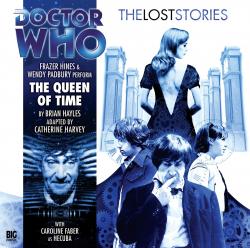
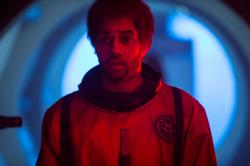
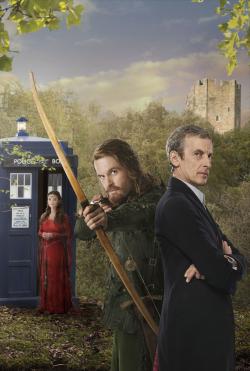

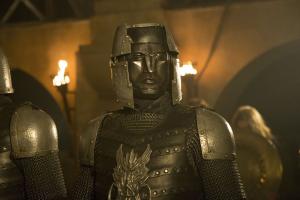 The episode has a lot of snappy elements to enjoy. One of the really funny moments involves a contest to find the best archer in land. The Doctor's marksmanship being top-notch somehow feels right for the Twelfth Doctor, and it is good to see him with a weapon other than sonic screwdriver .. for a few moments anyway. The prize of the golden arrow is tied into plot well, making this sequence not only entertaining but also key to the story. Less positively some dialogue comes off as cod-mediaeval, reminding me of '
The episode has a lot of snappy elements to enjoy. One of the really funny moments involves a contest to find the best archer in land. The Doctor's marksmanship being top-notch somehow feels right for the Twelfth Doctor, and it is good to see him with a weapon other than sonic screwdriver .. for a few moments anyway. The prize of the golden arrow is tied into plot well, making this sequence not only entertaining but also key to the story. Less positively some dialogue comes off as cod-mediaeval, reminding me of '